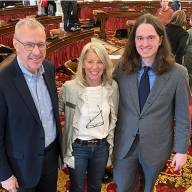Reviewing “The Librarians” for this week’s paper was painful. As someone who was raised to revere, pursue, respect and read books, it was hard to watch books (and the librarians who curated them) vilified for defending everyone’s right to read whatever they want.
Couched behind concern for children’s mental health, and (their little sensibilities), these banners of books are creating a bunch of noise to hide the fact that they are trying to censor ideas.
They are trying to tell people what they can and cannot read and what your kids can and cannot be exposed to or have access to. The librarians featured in this film are clear – no one gets to pick their reading materials or anyone else’s reading material.
There’s an obvious stupidity in the arguments advanced by some of these book banners. One banned book shows characters walking in a statuary garden. The walkway is lined with Greek god/goddess-type figures that are naked. They are not naked in a Playboy magazine way, they are naked in a public art kind of way. That book was banned due to nudity. God forbid any of these book banners or their kids ever visit public places in the U.S. and abroad where such statutes are found.
But then there’s also the most basic fundamental of dealing with kids, teenagers and young adults – call something awful, naughty and bad for you. Then ban it. Watch what happens – it becomes the most sought-after thing ever. Banning books only makes them more attractive. It’s 2025, not 1925 kids can access and find anything that’s been banned.
There are parts of the movie that will take your breath away, in a way bad way. In one Texas town, law enforcement sought access to data to see which kids had checked out which books. If minors checked out books deemed inappropriate who was going to face liability? The librarian? The parent?
“Our schools are not your church,” said one parent in the face of efforts to ban books in local schools.
And that’s the point – no one gets to impose their own morality and religious beliefs on others, particularly via public places like schools and the local library.
You might also like












